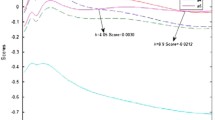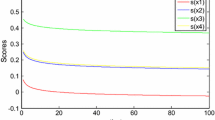Abstract
Computational models of various linguistic term sets whose evaluation scales are the identity functions have been extensively investigated. Among these models, although the virtual linguistic model is the most straightforward and convenient for the calculations, the operations are not closed on the given scales. In this paper, we develop the fuzzy logical algebras-based virtual linguistic model. We propose the generalized linguistic term sets based on general strictly increasing functions with the existing linguistic term sets as special cases, and define some novel operational laws and measures such as similarity measures, distance measures and entropy measures for them. Then we provide some linguistic aggregation operators for the generalized linguistic term sets in multi-attribute decision making. Particularly, when these operators are reduced to the existing ones, it is shown that the proposed operational laws can be considered as a modification of the existing ones in related literature. Based on the proposed operators, a multi-attribute decision-making model is built, and a method for determining the objective–subjective weight vector in generalized linguistic term sets are put forward. Finally, an illustrative example is presented for verifying our models and methods and a comparative analysis with the existing methods is made.




Similar content being viewed by others
References
Bonissone PP, Decker KS (1986) Selecting uncertainty calculi and granularity: an experiment in trading-off precision and complexity. In: Kanal LH, Lemmer JF (eds) Uncertainty in artificial intelligence. North-Holland, Amsterdam
Bordogna G, Fedrizzi M, Pasi G (1997) A linguistic modeling of consensus in group decision making based on OWA operators. IEEE Trans Syst Man Cybern Part A Syst Hum 27:126–132
Cai M, Gong Z, Yu X (2019) A method for unbalanced linguistic term sets and its application in group decision making. Int J Fuzzy Syst 19:671–682
Dai YQ, Xu ZS, Da QL (2008) New evaluation scale of linguistic information and its application. Chin J Manag Sci 16:145–149
Degani R, Bortolan G (1988) The problem of linguistic approximation in clinical decision making. Int J Approx Reason 2:143–162
Delgado M, Verdegay JL, Vila MA (1993) On aggregation operations of linguistic labels. Int J Intell Syst 8:351–370
Farhadinia B (2016) Determination of entropy measures for the ordinal scale-based linguistic models. Inf Sci 369:63–79
Forbus KD (1984) Qualitative process theory. Artif Intell 24:85–168
Gou XJ, Xu ZS (2016) Novel basic operational laws for linguistic terms, hesitant fuzzy linguistic term sets and probabilistic linguistic term sets. Inf Sci 372:407–427
Gou XJ, Xu ZS, Liao HC (2017) Multi-criteria decision making based on bonferroni means with hesitant fuzzy linguistic information. Soft Comput 21:6515–6529
Gupta PK, Muhuri PK (2019) Computing with words for student strategy evaluation in an examination. Granul Comput 4:167–184
Hájek P (1998) Metamathematics of fuzzy logic. Kluwer Academic Publishers, Dordrecht
Herrera F, Martinez L (2000) A 2-tuple fuzzy linguistic representation model for computing with words. IEEE Trans fuzzy Syst 8:746–752
Herrera F, Martinez L (2001) The 2-tuple linguistic computational model, advantages of its linguistic description, accuracy and consistency. Int J Uncertain Fuzziness Knowl Based Syst 9:33–48
Herrera F, Herrera-Viedma E, Verdegay JL (1996) A model of consensus in group decision making under linguistic assessments. Fuzzy Sets Syst 78:73–87
Herrera F, Herrera-Viedma E, Martinez L (2008) A fuzzy linguistic methodology to deal with unbalanced linguistic term sets. IEEE Trans Fuzzy Syst 16:354–370
Herrera F, Alonso S, Chiclana F, Herrera-Viedma E (2009) Computing with words in decision making: foundations, trends and prospects. Fuzzy Optim Decis Mak 8:337–364
Insel M, Helvaciouglu IH (1997) Manoeuvrability analysis of double ended ferries in preliminary design. In: Eleventh ship control systems symposium, Southampton, UK, pp 127–141
Lan J, Chen Y, Ning M, Wang Z (2015) A new linguistic aggregation operator and its application to multiple attribute decision making. Oper Res Perspect 2:156–164
Levrat E, Voisin A, Bombardier S, Bremont J (1997) Subjective evaluation of car seat comfort with fuzzy set techniques. Int J Intell Syst 12:891–913
Liu J, Li WJ, Chen SW, Xu Y (2014) An axiomatizable logical foundation for lattice-ordered qualitative linguistic approach for reasoning with words. Inf Sci 263:110–125
Luo S, Zhang H, Wang J, Li L (2019) Group decision-making approach for evaluating the sustainability of constructed wetlands with probabilistic linguistic preference relations. J Oper Res Soc. https://doi.org/10.1080/01605682.2018.1510806
Ma ZM, Xu ZS (2018) Hyperbolic scales involving appetites-based intuitionistic multiplicative preference relations for group decision making. Inf Sci 451–452:310–325
Martinez L, Rodriguez RM, Herrera F (2015) The 2-tuple linguistic model, computing with words in decision making. Springer, New York
Olcer AI, Odabasi AY (2005) A new fuzzy multiple attribute group decision making methodology and its application to propulsion/manoeuvring systems selection problem. Eur J Oper Res 166:93–114
Saaty TL (1980) The analytic hierarchy process. Mc Graw-Hill Inc., New York
Santiago ZC, Luis ER, Alvaro PN (2020) Decision making with linguistic information for the development of new products. In: Arai K, Kapoor S (eds) Advances in computer vision. CVC 2019. Advances in intelligent systems and computing, vol 943. Springer, Cham
Tang J, Meng F (2019) Linguistic intuitionistic fuzzy Hamacher aggregation operators and their application to group decision making. Granul Comput 4:109–124
Wang H, Ma D (1993) Scale evaluation and new scale methods. Syst Eng Theory Pract 5:24–26
Xu ZS (2000) A simulation-based evaluation of several scales in the analytic hierarchy process. Syst Eng Theory Pract 7:58–62
Xu ZS (2004) A method based on linguistic aggregation operators for group decision making with linguistic preference relations. Inf Sci 166:19–30
Xu ZS (2004) EOWA and EOWG operators for aggregating linguistic labels based on linguistic preference relations. Int J Uncertain Fuzziness Knowl Based Syst 12:791–810
Xu ZS (2005) Deviation measures of linguistic preference relations in group decision making. Omega 33:249–254
Xu ZS (2006) On generalized induced linguistic aggregation operators. Int J Gen Syst 35:17–28
Xu ZS (2007) A method for multiple attribute decision making with incomplete weight information in linguistic setting. Knowl Based Syst 20:719–725
Xu ZS (2012) Linguistic decision making: theory and methods. Science Press, Beijing
Xu ZS, Wang H (2017) On the syntax and semantics of virtual linguistic terms for information fusion in decision making. Inf Fusion 34:43–48
Xu Y, Wen X, Sun H, Wang H (2018) Consistency and consensus models with local adjustment strategy for hesitant fuzzy linguistic preference relations. Int J Fuzzy Syst 20:2216–2233
Zhang YX, Xu ZS, Wang H, Liao HC (2016) Consistency-based risk assessment with probabilistic linguistic preference relation. Appl Soft Comput 49:817–833
Zulueta-Veliz Y, Sanchez PJ (2018) Linguistic dynamic multicriteria decision making using symbolic linguistic computing models. Granul Comput 3:229–244
Acknowledgements
The authors are very grateful to the anonymous reviewers for their insightful and constructive comments and suggestions that have led to an improved version of this paper. This research was supported by the Natural Science Foundation of Shandong Province (no. ZR2017MG027) and the AMEP (DYSP) of Linyi University (no. LYDX2014BS017).
Author information
Authors and Affiliations
Corresponding author
Ethics declarations
Conflict of interest
The authors declare that they have no conflict of interest.
Additional information
Publisher's Note
Springer Nature remains neutral with regard to jurisdictional claims in published maps and institutional affiliations.
Rights and permissions
About this article
Cite this article
Ma, Z.M., Xu, Z.S. Computation of generalized linguistic term sets based on fuzzy logical algebras for multi-attribute decision making. Granul. Comput. 5, 17–28 (2020). https://doi.org/10.1007/s41066-019-00199-x
Received:
Accepted:
Published:
Issue Date:
DOI: https://doi.org/10.1007/s41066-019-00199-x




